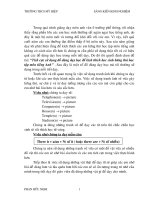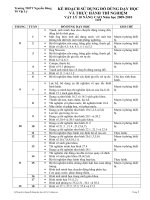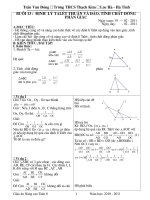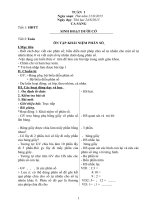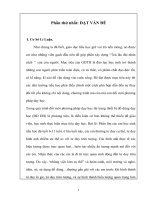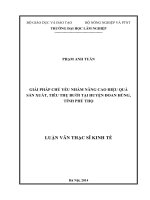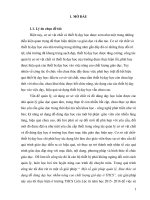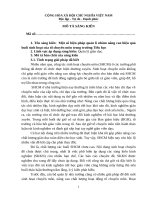Nâng cao DDDH buổi 9
Bạn đang xem bản rút gọn của tài liệu. Xem và tải ngay bản đầy đủ của tài liệu tại đây (329.95 KB, 4 trang )
PRO 3M/3MPLUS – ƠN LUYỆN TỒN DIỆN CHO KÌ THI TỐT NGHIỆP THPT QUỐC GIA
Biên soạn: Cô Vũ Thị Mai Phương – Ngoaingu24h.vn
TÀI LIỆU ĐI KÈM LIVESTREAM
LUYỆN ĐỌC HIỂU NÂNG CAO ( BUỔI 19)
Theo dõi LIVESTREAM ĐỘC QUYỀN của cô vào lúc
20h30 ngày 23/1/2021 duy nhất trên khóa học PRO 3MPLUS
Cơ Vũ Thị Mai Phương
ai
:T
ge
Pa
Trích đề thi thử lần 1 trường THPT Quảng Xương 1 – Thanh Hóa
Read the following passage and mark the letter A, B, C, or D on your answer sheet to indicate the
correct answer to each of the questions from 1 to 7.
August 8th this year marked the Earth Overshoot Day, which essentially means that we have officially
consumed far more than the Earth can replenish in a year. The Global Footprint Network estimates that
the current population requires resources equivalent to that of over 1.6 Earths. And the UN projects that
our population may balloon to upwards of 8.5 billion by 2030. As the population grows, more and more
lands are allocated for urbanization, taking up resources that could be used for agriculture and vegetation.
On top of this, the wastes and pollution resulting from human activity speeds up the degradation and
deterioration of resources.
Harvard University Graduate School of Design research professor, Richard Forman and professor of
sustainability science at Arizona State University, Jianguo Wu wrote a call for global and regional urban
planning approaches. They say that existing communities are built in the wrong places, places that should
have been allocated for nature and agriculture. "Most settlements began on good agricultural soil near a
body of fresh water and natural vegetation," they wrote in Nature. "Episodes of urban expansion therefore
cover or pollute once-valuable natural resources at ever increasing range. Meanwhile, the exploding urban
population is inundated with solid waste, wastewater, heat and pollutants."
So, where do we put future humans?
Although plans of colonizing Mars have been making the rounds lately, that plan is too far ahead and
we need solutions here and now. The professors insist that a strategic, environment-driven urban planning
system is the key to minimizing the impact of population growth, despite environmental protection being
at the bottom of the pile when it comes to government priorities. "Urban planning can slow such
degradation, and even improve matters. But protecting natural and agricultural land, water bodies and
biodiversity are rarely top priorities for municipal governments. Planners focus on creating jobs, housing,
transport and economic growth," they wrote. They say that strategically pinpointing locations for
settlements must be environment-conscious: "It must consider which areas are best placed to support
higher populations without greatly increasing the already heavy ecological footprint on our finite Earth."
After ruling out areas with harsh conditions as well as areas more suitable for natural reserves,
according to the professors, these areas have the most suitable locations for building human communities:
South America, southern Canada, north and eastern United States, south-central Africa, north of the
Himalayas and an area from the Black Sea to north China, and Oceania. Regardless of which argument
people convoke in an attempt to "debunk" overpopulation as a problem, strategic urban planning would
benefit the quality of living for all, if executed properly. However, this cannot easily be done without
international cooperation, policies, and proper implementation. "Society must think globally, plan
regionally, then act locally," they add.
(Source: />
eu
Li
K
a
ho
ay
H
oc
H
n
ie
M
im
iK
Ph
an
V
KHÓA HỌC PRO3M/PRO3MPLUS – CHINH PHỤC ĐIỂM 9+ MÔN TIẾNG ANH CÙNG CÔ VŨ MAI PHƯƠNG
PRO 3M/3MPLUS – ƠN LUYỆN TỒN DIỆN CHO KÌ THI TỐT NGHIỆP THPT QUỐC GIA
Biên soạn: Cô Vũ Thị Mai Phương – Ngoaingu24h.vn
ai
:T
ge
Pa
Question 1: Which of the following could best reflect the main idea of the passage?
A. Scientists are searching new suitable places for people to live.
B. The Earth must globally be cared about overpopulation's consequences.
C. Effective environmental measures should be discussed to protect the Earth from overpopulation.
D. The Earth is too overpopulated to live.
Question 2: The word "replenish" in paragraph 1 is the closest in meaning to_____
A. repair
B. reduce
C. germinate
D. regenerate
Question 3: According to the passage, which of the following is TRUE about our population?
A. Wastes and pollution from human activities do not cause much impact on natural vegetation.
B. The more population grows, the more resources are deteriorated.
C . The Earth may support more than a half our resources' demand.
D. As the population increases, more lands are used for cultivation.
Question 4: What is the synonym of the word "inundated" in paragraph 2?
A. contaminated
B. outdated
C. overwhelmed
D. established
Question 5: What does the "it" in paragraph 3 C. refer to?
A. the impact of population growth
B. the pile
C. environmental protection
D. the key
Question 6: The following are what municipal governments most concern, EXCEPT_____
A. economy
B. biodiversity
C. accommodation
D. employment
Question 7: It can be inferred from the passage that_______
A. If the world population continues to explode, future humans will have no place to live.
B. People should reduce urbanization to control the overpopulation.
C. Overpopulation is not only a country's problem, so every nation must let the world solve it.
D. The fresh water and natural vegetation will be destroyed before we can find another place for future
humans to live.
eu
Li
K
a
ho
ay
H
oc
H
n
ie
M
Trích đề thi thử lần 1 trường THPT Quảng Xương 1 – Thanh Hóa
Read the following passage and mark the letter A, B, C, or D on your answer sheet to indicate the
correct answer to each of the questions from 8 to 12.
Educating children at home as an alternative to formal education is an option chosen by families in
many parts of the world. The homeschooling movement is popular in the United States, where close to
one million Children are educated at home. In Canada, 1 percent of school-age children are homeschooled,
and the idea also enjoys growing popularity in Australia, where 20,000 families homeschool their
children. The movement is not limited to these countries. Homeschooling families can be found all over
the world, from Japan to Taiwan to Argentina to South Africa.
Homeschooling is not a novel idea. In fact, the idea of sending children to spend most of their day
away from home at a formal school is a relatively new custom. In the United States, for example, it was
not until the latter part of the nineteenth century that state governments began making school attendance
compulsory. Before that, the concept of a formal education was not so widespread. Children learned the
skills they would need for adult life at home from tutors or their parents, through formal instruction or by
working side by side with the adults of the family.
im
iK
Ph
an
V
KHĨA HỌC PRO3M/PRO3MPLUS – CHINH PHỤC ĐIỂM 9+ MƠN TIẾNG ANH CÙNG CÔ VŨ MAI PHƯƠNG
PRO 3M/3MPLUS – ƠN LUYỆN TỒN DIỆN CHO KÌ THI TỐT NGHIỆP THPT QUỐC GIA
Biên soạn: Cô Vũ Thị Mai Phương – Ngoaingu24h.vn
ai
:T
ge
Pa
In the modern developed world, where the vast majority of children attend school, families choose
homeschooling for a variety of reasons. For people who live in remote areas, such as the Australian
outback or the Alaskan Wilderness, homeschooling may be their only option. Children who have
exceptional talents in the arts or other areas may be homeschooled so that they have more time to devote
to their special interests. Much of the homeschooling movement is made up of families who, for various
reasons, are dissatisfied with the schools available to them. They may have a differing educational
philosophy, they may be concerned about the safety of the school environment, or they may feel that the
local schools cannot adequately address their children's educational needs. Although most families
continue to choose a traditional classroom education for their children, homeschooling as an alternative
educational option is becoming more popular.
(Adapted from Essential words for the IELTS by Dr. Lin Lougheed)
Question 8: Which of the following could be the main idea of the passage?
A. The reasons why children should be educated at home.
B. The origin of homeschooling.
C. Homeschool option: a common form of education all over the world.
D. A new form of school: Homeschooling
Question 9: What does the word "that" in paragraph 2 refer to?
A. the second half of the 19th century
B. the former part of the 19th century
C. the end of the 19th century
D. the beginning of the 1 9th century
Question 10: According to the passage, the following are true about the Homeschooling,
EXCEPT______
A. Before modern times, most students did not attend the school.
B. People got familiar with school attendance before choosing to learn at home.
C. Parents or tutors were the ones who taught the children necessary skills in society.
D. Many families in both developed and developing countries choose to educate their children at home.
Question 11: The word "adequately" in paragraph 3 is closest in meaning to
A. applicably
B. correctly
C. inappropriately
D. sufficiently
Question 12: As mentioned in the last paragraph, children in rural areas_____
A. believe that their needs to study is more than what a normal school can provide.
B. prefer to improve their extraordinary interests.
C. are not contented with the philosophy of the schools available.
D. have no choice but stay at home to learn
Trích đề thi thử lần 1 trường THPT Chuyên Khoa học tự nhiên – Hà Nội
Read the following passage and mark the letter A, B, C or D on your answer sheet to indicate the correct
answer to each of the questions
The relationship between Britain and the US has always been a close one. Like all close relationships
it has had difficult times. The US was first a British colony, but between 1775 and 1783 the US fought a
war to become independent. The US fought the British again in the War of 1812.
In general, however, the two countries have felt closer to each other than to any other country, and their
foreign policies have shown this. During World War I and World War II, and more recently in the Gulf
War and the Iraq War, Britain and the US supported each other. When the US looks for foreign support,
Britain is usually the first country to come forward and it is sometimes called ‘the 51st state of the union’.
eu
Li
K
a
ho
ay
H
oc
H
n
ie
M
im
iK
Ph
an
V
KHÓA HỌC PRO3M/PRO3MPLUS – CHINH PHỤC ĐIỂM 9+ MÔN TIẾNG ANH CÙNG CÔ VŨ MAI PHƯƠNG
PRO 3M/3MPLUS – ƠN LUYỆN TỒN DIỆN CHO KÌ THI TỐT NGHIỆP THPT QUỐC GIA
Biên soạn: Cô Vũ Thị Mai Phương – Ngoaingu24h.vn
ai
:T
ge
Pa
But the special relationship that developed after 1945 is not explained only by shared political interests.
An important reason for the friendship is that the people of the two countries are very similar. They share
the same language and enjoy each other’s literature, films and television. Many Americans have British
ancestors, or relatives still living in Britain. The US government and political system is based on Britain’s,
and there are many Anglo-American businesses operating on both sides of the Atlantic. In Britain some
people are worried about the extent of US influence, and there is some jealousy of its current power. The
special relationship was strong in the early 1980s when Margaret Thatcher was Prime Minister in Britain
and Ronald Reagan was President of the US.
(Adapted from Background to British and American Cultures)
Question 13: What is the passage mainly about?
A. The strong friendship between the UK and the US
B. The close relationship between Britain and the US
C. A special relationship the UK developed during the World Wars
D. A special influence the US had on the UK during the World Wars.
Question 14: The phrase “ come forward” in paragraph 2 mostly means_____
A. be willing to help
B. be able to help C. be reluctant to help
D. be eager to help
Question 15: The word “ they” in paragraph 3 prefers to_____
A. countries
B. people
C. political interests
D. British ancestors
Question 16: Which of the following is NOT mentioned as a reason for the special relationship between
Britain and the US?
A. The people of two countries are very similar
B. Many American have British ancestors
C. British Prime Minister and the US President are close friends
D. Many Anglo-American businesses are operating in the two countries
Question 17: Britain and the US are close to each other NOT because of their_____
A. foreign policies
B. power
C. political interests
D. language
eu
Li
K
a
ho
ay
H
oc
H
n
ie
M
im
iK
Ph
an
V
KHÓA HỌC PRO3M/PRO3MPLUS – CHINH PHỤC ĐIỂM 9+ MÔN TIẾNG ANH CÙNG CÔ VŨ MAI PHƯƠNG
